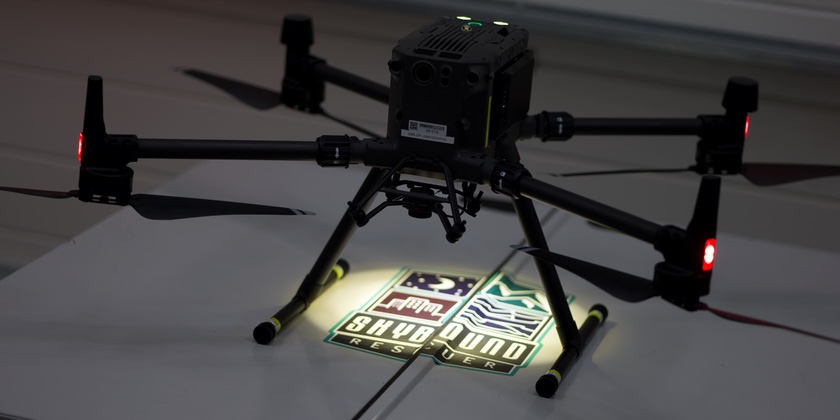Welsh Ambulance Service exploring drone use for defibrillator delivery

The Welsh Ambulance Service has taken a step closer to using drones to fly defibrillators to patients.
The Trust has teamed-up with the University of Warwick and industry partners SkyBound to explore whether drone-delivered defibrillators could make a difference to someone in cardiac arrest.
When someone has a cardiac arrest, they either stop breathing entirely or take gasping or infrequent breaths.
As well as immediate cardiopulmonary resuscitation (CPR), a defibrillator can help to restart their heart while waiting for the emergency services to arrive.
More than 6,000 people have a cardiac arrest in the community in Wales every year.
“In a cardiac arrest, every second counts,” said Carl Powell, the Welsh Ambulance Service’s Clinical Lead for Acute Care.
“We will always send an ambulance as quickly as possible on lights and sirens, but starting chest compressions and delivering an electric shock with a defibrillator in the meantime could mean the difference between life and death.
“If you’re helping someone in cardiac arrest, it might be difficult to find a defibrillator soon enough to make a real difference, especially in rural areas and especially if you’re the only person there, which is why we’re thinking about better ways to get help to patients.
Professor Nigel Rees, the Trust’s Assistant Director of Research and Innovation, said: “Drone-delivered defibrillators might sound like something from a sci-fi movie, but if it’s the quickest way to get a defibrillator to a patient, it’s a fantastic tool in our locker to improve survival rates.
“Lone bystanders aren’t currently instructed by ambulance call handlers to leave a patient to retrieve a nearby defibrillator, as the priority is the chest compressions.
“Delivering a defibrillator directly to them would negate the need to leave the patient, and potentially improve chances of survival.”
Funding from Resuscitation Council UK enabled the Drone-Delivered Defibrillators study – or ‘3D Project’ – to conduct a number of test flights to demonstrate the feasibility of delivering a defibrillator via drone after a 999 call.
Further funding from the National Institute of Health Research and Health and Care Research Wales has enabled the 3D Project to enter its next phase, which is to interview people who have helped someone in a real-life cardiac arrest to understand the difference that a drone-delivered defibrillator could have made.
This summer, researchers will also perform long-distance ‘beyond visual line of sight’ flights to demonstrate how real-time communications between the 999 control room and a drone operation team would work during a cardiac arrest call.
Dr Christopher Smith, Clinical Lecturer in Emergency Medicine at the University of Warwick, said: “Early CPR and defibrillation are crucial if we are to improve survival from out-of-hospital cardiac arrest.
“Drones may be one way of getting a life-saving defibrillator to more patients faster than before.
“This project allows us to optimise the processes required and is an important step in making an effective drone-delivered defibrillator system a reality for the UK in the near future.”
Gemma Alcock, Chief Executive at SkyBound, added: “This collaboration represents a significant step forward in leveraging technology to potentially save lives, particularly in remote areas where access to defibrillators can be challenging.
“Our involvement underscores the very reason SkyBound came into fruition, as the initial inspiration came from the experience I gained as a beach lifeguard where I dealt with a life-critical incident.
“This was the foundation of our commitment to harnessing innovative drone solutions to enhance emergency response and ultimately, save lives.”
The 3D Project is one of a number of studies involving the Welsh Ambulance Service, which earlier this month was granted University Trust status by Welsh Government in recognition of its commitment to drive research and innovation.
Professor Rees said: “We have an extensive research portfolio, and this is an example of the longstanding partnership we have with the University of Warwick and other partners conducting research and innovation that is of international significance.
“University Trust status formally recognises the world-class research we undertake to improve public health and patient care-enhancing knowledge, as well as advancing treatments in the NHS and making a difference to people’s lives.
“It also helps our patients, population and stakeholders to understand the vital links between health, education and research which lead to better outcomes for us all.”
The 3D Project is due to conclude in October 2024 and the results will be available in early 2025.
Picture: SkyBound Rescuer
Spotted something? Got a story? Email [email protected]












